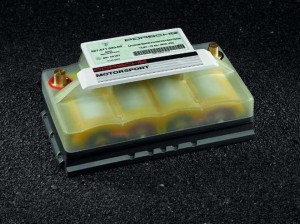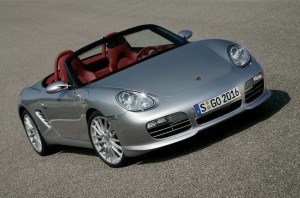
For some makers, lithium-ion batteries are essential to create tomorrow's electric vehicles. Porsche sees them as a lightweight alternative to improving performance on the track.
While most makers are looking at lithium-ion chemistry as the must-have technology for tomorrow’s battery-powered cars, Porsche sees an entirely different opportunity. The automaker is claiming it will be the first automaker to mass market LIon batteries, but in this case, the goal is to shave weight and improve the performance of its trademark sports cars.
Starting next January, buyers will be able to opt for a lithium battery, rather than the conventional lead-acid power pack, in Porsche’s 911 GT3, 911 GT3 RS, and Boxster Spyder models. The $1,700 price tag may be steep, but for those looking for an advantage on the track – or simply when the light turns green – that’s a fair price to pay for the 13 pound 6 ounce battery, which weighs in a full 22 lbs lighter than the lead-acid pack it replaces.
Overall, the dimensions of the replacement and standard battery packs are about the same, though the lightweight LIon pack is 2.8 inches lower. It generates the same voltage and uses the same connections, Porsche notes, adding that would permit fast changes on a track.

The Porsche Boxster Spyder will be offered with a $1,700 optional lithium-ion battery, starting next January; retrofit LIon packs will follow.
Though rated at just 18 Amp-hours, the automaker claims the lithium system matches the performance of a 60 Ah lead-acid battery – with one critical exception. It can only be used to start the car at temperatures above 32 degrees Fahrenheit. When it gets colder, a driver will need to switch back to lead-acid, which is included when ordering the LIon option.
That’s a problem facing all manufacturers planning to use lithium technology, especially for advanced hybrids and pure battery-electric vehicles, or BEVs. “Lithium likes the same temperatures we do,” says Tony Posawatz, director of General Motors’ Chevrolet Volt project. In vehicles like Volt of the Nissan Leaf BEV, a climate control system will be used to keep the temperature of the LIon packs as close to 70 degrees as possible.
Porsche’s new battery is based on a wound film of carbon and iron phosphate with a ceramic film moisturized by the electrolyte that serves as a separating layer. There are, in fact, 14 different and distinct chemical families that are generally grouped under the heading “lithium-ion.” Some store greater amounts of energy, others store less power but can provide a bigger jolt of current when needed for demanding tasks, like starting a car.
Another difference between a lithium battery and a conventional lead-acid pack is the advanced electronic control system needed to ensure that LIon cells charge and discharge properly. Otherwise, they are prone to fire or chemical breakdowns.
Porsche says it will make the new lithium batteries available for retrofitting on the three models through its Porsche Tequipment unit, starting next February.
